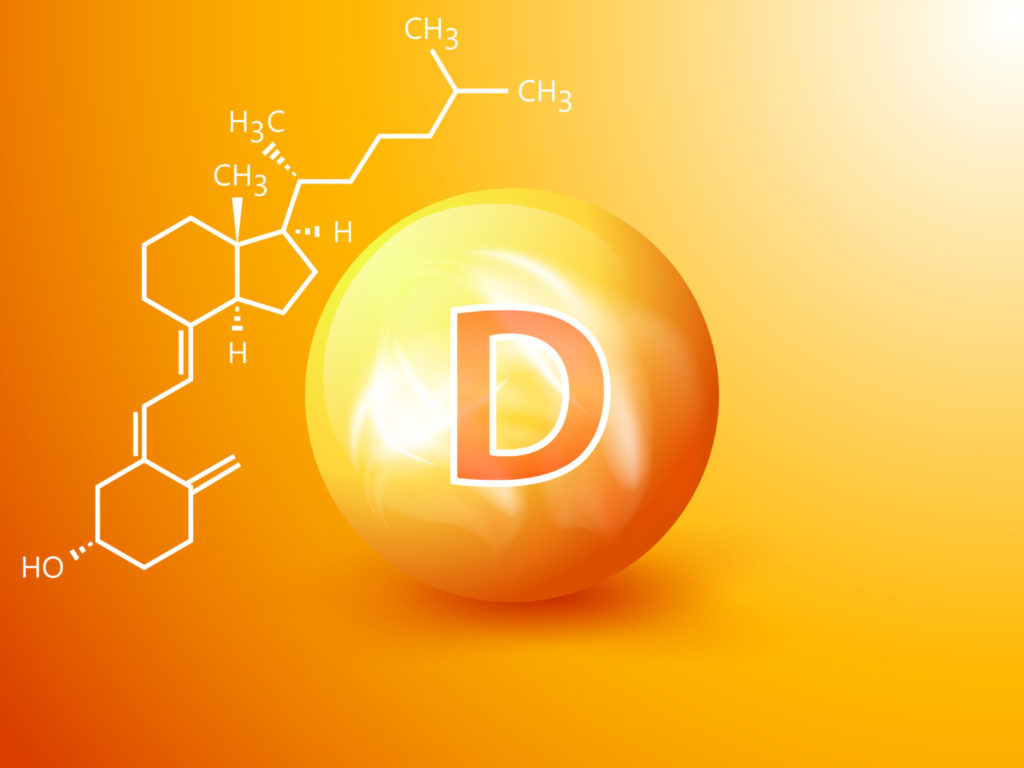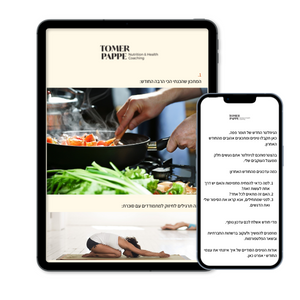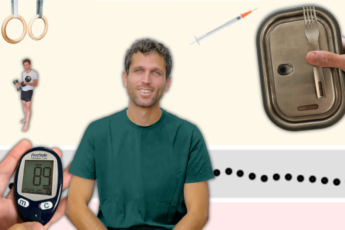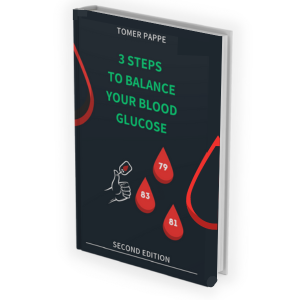
Paired Autoimmune Diseases
What is the connection between Type 1 Diabetes Hashimoto’s, Crohn’s, Celiac disease and many other autoimmune conditions?
As a type 1 diabetic over the years, I have heard quite a few sentences like “If you have been diagnosed with an autoimmune disease, you probably have an autoimmune tendency because of a compromised immune system.” Does this mean that if I am diagnosed with one autoimmune disease I will definitely be diagnosed with another autoimmune disease? Not necessarily. There is no certainty here. For those diagnosed with any autoimmune disease, it is recommended to keep an eye on the pulse and periodically check the blood tests for antibodies to diagnose other autoimmune diseases. It is especially important to avoid factors that undermine the immune system as much as possible.
What factors undermine the immune system?
- External toxins and physical and mental toxins. Toxins such as – sugar, gluten, processed food, coffee, alcohol, mental stress – any factor that keeps us away from our natural life. Based on my personal experience, foods that encourage anti-inflammatory processes are the foods that best balance the immune system because of the connection between inflammation and autoimmune diseases. As a start I would suggest choosing one of the protocols: low carb diet, AIP diet or PKD diet. I call these approaches – nutrition for autoimmune diseases.
An interesting question that has not yet been answered is what came before what? An unbalanced immune system that created an unbalanced environment for the cells in our body? Or environmental toxins that created an unbalanced immune system?
Table of contents:
When it comes to autoimmune diseases the key word is inflammation
What is the root cause of the outbreak of autoimmune diseases? After all, this is the most unnatural situation there is. This is a system that attacks itself, somewhat similar to an army that consciously fires at its forces. It is not always easy for science to deal with the root cause of autoimmune diseases, and some say that under the umbrella of “autoimmune diseases” are all diseases whose cause is still unknown. I will try to simplify the process briefly – the attack on the body’s cells occurs when autoantibodies and inflammatory proteins are produced against the body’s cells and tissues. When the inflammation in the body increases, so does the destruction of the cells, tissues and organs in the more vulnerable areas.
The damage can be manifested in only one organ, such as the pancreas (as in my type 1 diabetes), the thyroid gland (Hashimoto’s), nerve cells (multiple sclerosis) or the intestine (Crohn’s) and it can also be manifested in a multisystemic way, that is, damage to several organs at the same time, for example Lupus/lupus and the antiphospholipid antibody syndrome in which autoantibodies develop against cells or components in the cell membrane.
How did I reduce the inflammation in the body to reduce the outbreak of autoimmune diseases?
I personally believe that outbreaks of autoimmune diseases, some of which are defined in the medical world as “chronic diseases”, can be avoided in advance. Apparently we don’t hear in the official recommendations about the possibility of balancing and calming the immune system naturally. Having experienced outbreaks of autoimmune diseases in my life, I believe that the conditions that provide ground for autoimmune attacks are mainly due to our unnatural lifestyle. Some believe that once we return to the right diet for us, stop consuming processed food and reduce exposure to toxins, we will also reduce the outbreak of most autoimmune diseases. Besides the factors that are under our control, we should always remember that there are environmental factors that we don’t always think about such as: living near cellular antennas, mold, chemical waste and polluting factories. Another interesting factor for the outbreak of autoimmune diseases is an overly sterile environment like in the Nordic countries where the incidence of autoimmune diseases is high compared to the rest of the world. This figure raises interesting questions about the connection between the environment and modern diseases or about the way in which an environment rich in bacteria contributes to our health. The connection between bacteria and health reminds me a bit of the saying that “the best thing you can do for your child is to let him play in the sand and buy him a dog”.
Quite a lot has been claimed in the past about the connection between milk and the outbreak of autoimmune diseases. If we go even further to the beginning of the life cycle: is there a connection to breastfeeding? What does it have to do with breast milk? What is the difference between synthetic breastfeeding from breast milk substitute versus breastfeeding from natural breast milk of a healthy and fertile mother. Does synthetic breastfeeding have such far-reaching consequences that it causes the outbreak of autoimmune diseases later in the child’s life? The answer to this question is not unequivocal and the issue must be investigated in depth. Dr. Weston A. Price has researched the relationship between the mother’s diet and the health of the offspring quite a bit. Every time we move away from nature, problems begin, especially when it comes to such a necessary mechanism for the development of organisms as feeding in mother’s milk. Mother’s milk has all the nutrients necessary for the construction and development of new tissues. This is a masterpiece of nature. The same breast milk is rich in enzymes and nutrients for building and increased production of cells and tissues, for reducing inflammation and even building an emotional bond with the nursing mother. All these and much more are found in mother’s milk. It is not for nothing that throughout our evolution as a human species we have always made sure that the most nutrient-rich parts of the hunted animals, the internal organs, are eaten first by nursing mothers and pregnant women.
These are still questions that are not so simple to answer and not enough studies have been done on the relationship between breastfeeding and the outbreak of autoimmune diseases.
Hormonal imbalance
We already know that there is a connection between the appearance of more than one autoimmune disease. There is truth in the fact that a person diagnosed with one autoimmune disease has a relatively high probability of being diagnosed with another autoimmune disease.
I experienced at the age of 11 an outbreak of type 1 diabetes and later in my 20s I experienced an outbreak of Hashimoto’s disease. After researching and checking I realized this is a common combination. When you understand how the different glands work together in complete harmony in our body, you begin to understand the mechanism behind these eruptions. When one gland is out of balance, the other glands are also out of balance. The thyroid gland is a sensitive gland in our body. In its natural state it reacts to internal and environmental changes and especially to stress and physiological changes. When the body is at rest the thyroid gland releases less Vermons confirms when we are in danger in a “fight or flight” situation. In such a stressful situation the thyroid gland will release an increased amount of hormones so that the body can use them immediately for available energy.
A few years ago when my blood sugar was unbalanced for a long period of time the thyroid began to function poorly, which is called hypothyroidism. I recognized the condition relatively quickly due to the appearance of the symptoms of hypothyroidism which I knew from reading books about the phenomenon. What happened is that apparently an imbalance in blood sugar upset the hormonal system and the thyroid was faced with a challenging task that burdened it and ultimately made it difficult for it to function at an adequate level. If I had ignored my condition and not balanced the sugar in time, it is possible that the autoimmune attack on the thyroid gland (Hashimoto’s) would have led to the complete destruction of the gland.
What can be learned from my story?
It is important to me to raise awareness of the phenomenon of paired autoimmune diseases. The combination of type 1 diabetes, celiac disease, Hashimoto’s and Crohn’s and other autoimmune diseases is a common combination in the population and this combination is well known to the world of science.
The best advice I can give you is to go to a doctor who is aware of the issue and will be able to guide you along this path. If you have already been diagnosed with one autoimmune disease, I would recommend asking the doctor to periodically refer you to blood tests to rule out a diagnosis of other autoimmune diseases. You can also ask him to check symptoms for a preliminary diagnosis of an autoimmune disease if there is any suspicion of the appearance of another autoimmune disease.
The thyroid gland and its balance is a complex subject and it is highly recommended to go to a doctor who understands the phenomenon in the best possible way. You need to know which values to check and according to which ranges. Sometimes the ranges of the health insurance funds are too wide and therefore part of the population is underdiagnosed. It is also important to say that it is recommended to repeat hormonal tests several times and over a certain period of time to get a complete picture. It is less recommended to diagnose or decide on treatment based on a single test.

The Vitamin D connection
Various studies from different parts of the world have led to the conclusion that those living with autoimmune diseases walk around with low levels of vitamin D in the blood in its active form and also in its storage form in general. The question that needs to be asked is the same question from the beginning of the article – what came before what? Do low levels of vitamin D in the blood cause autoimmune diseases? Or are these autoimmune diseases they lead in an indirect way to low levels of vitamin D in those who live with them?
What is certain is that there is a close connection between low levels of vitamin D in the blood and autoimmune diseases. Autoimmune diseases are diseases of the immune system. All cells of the immune system use vitamin D for daily functioning purposes. For the proper functioning of the cells of the immune system, the body needs to use vitamin D effectively after absorbing UV rays. After that, the body has to channel the vitamin (which is actually a hormone) to the target cells at a sufficient rate. It is a complex process that according to literature the origin of this process started at the beginning of evolution. In a metabolically healthy body, this process happens naturally when there is regular exposure to the sun without burning.
There is agreement that the outbreak of autoimmune diseases is significantly more common in populations with low levels of vitamin D in the blood. It can be said that vitamin D will buy us a kind of “self-immunization” when it comes to autoimmune diseases.
In my opinion, our basic premise should be that one should always strive for high levels of vitamin D in the blood and preferably in its natural form as a result of exposure to the sun. The only rule is to be exposed without getting burned.
*The information on this website is not intended to be a substitute for professional medical advice, diagnosis or treatment. The said information is intended for informational purposes only and stems from personal experience. The text is not intended to diagnose, treat or cure any specific disease or medical condition. Reviews and testimonials about nutrition, training and various health approaches represent individual experiences and what is stated on the site does not guarantee any results for your specific situation. Any choice of a specific way of eating or medical treatment according to a given situation should be made under the guidance of professionals qualified to do so.






